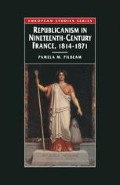Abstract
On 7 November 1852 an empire was formally and officially re-established. At one level the Second Empire marked the virtual disappearance of republicanism, particularly in the ‘silent years’1 of strict government censorship and rigid republican abstention in the 1850s and early 1860s. Many of the senior figures, including Ledru-Rollin and Blanc, were in exile and even in 1870 there were only 30 republicans in the Legislative Assembly. In May 1870 a leading young republican, Gambetta, admitted the plebiscite on liberal reform confirmed the continuing popularity of Louis-Napoleon. Yet the declaration of a republic in September 1870 aroused no opposition, except from radical republicans. In what ways did the aspirations of republicans change during the Empire? There were marked similarities between the parliamentary system of the Empire in 1870 and the republic created after its fall. This chapter will also ask to what extent the Empire itself was in process of being transformed into a republic by 1870, and if so, in response to what pressures.
Preview
Unable to display preview. Download preview PDF.
Notes
A. Plessis, De la Fête Impériale au mur des fédérés, 1852–71 (Paris, 1979), p. 51.
R. Huard, Le Mouvement républicain en Bas-Languedoc 1848–81 (Paris, 1982), p. 118.
T. Zeldin, The Political System of Napoleon III (London, 1958), p. 39.
C. H. Johnson, Utopian Communism in France. Cabet and The Icarians, 1839–51 (Ithaca, NY, 1974), pp. 260–99.
W. H. C. Smith, Second Empire and Commune: France 1848–1871 (London, 1985), p. 24.
M. Moissonnier, ‘La Section lyonnaise de l’Intérnational et l’opposition ouvrière à la fin du Second Empire, 1865–70’, Cahiers d’Histoire, 10 (1965), 275–314.
O. Barrot, De la Centralisation et de ses effets (Paris, 1863).
L. A. Prévost-Paradol, Le France Nouvelle (Paris, 1868).
L. M. Greenberg, Sisters of Liberty. Paris and the reaction to a centralized state 186S-71 (Cambridge, Mass., 1971).
A. Olivesi, La Commune de 1871 à Marseille et ses origines (Paris, 1950).
M. Moissonnier, La première Internationale et la commune à Lyon (Paris, 1972).
R. Tombs, The War against Paris (Cambridge, 1981).
A lucid exploration of the range of sympathies in R. Tombs, ‘Prudent rebels: the 2nd Arrondissement during the Paris Commune of 1871’, French History, 5 (1991), 393–413.
For a summary of recent writing on the Commune see the useful review article by R. Tombs, ‘L’année terrible 1870–1871’, Historical Journal, 35 (1992), 713–24.
Journal Officiel, 21 March 1871; quoted in S. Edwards, The Paris Commune, 1871 (London, 1971), pp. 155–6.
K. Marx, Civil War in France (London, 1872), p. 37.
E. Schulkind, The Paris Commune: the View from the Left (London, 1972);
J. Rougerie, Le Procès des Communards (Paris, 1964).
J. Goualt, Comment la France est devenue républicaine. Les élections générales et partielles à l’Assemblée nationale 1870–1875 (Paris, 1954), p. 116.
Copyright information
© 1995 Pamela M. Pilbeam
About this chapter
Cite this chapter
Pilbeam, P.M. (1995). From the Silent Years to Bloody Week: Republicans 1852–1871. In: Republicanism in Nineteenth-Century France, 1814–1871. European Studies Series. Palgrave, London. https://doi.org/10.1007/978-1-349-23860-6_10
Download citation
DOI: https://doi.org/10.1007/978-1-349-23860-6_10
Publisher Name: Palgrave, London
Print ISBN: 978-0-333-56672-5
Online ISBN: 978-1-349-23860-6
eBook Packages: Palgrave History CollectionHistory (R0)

